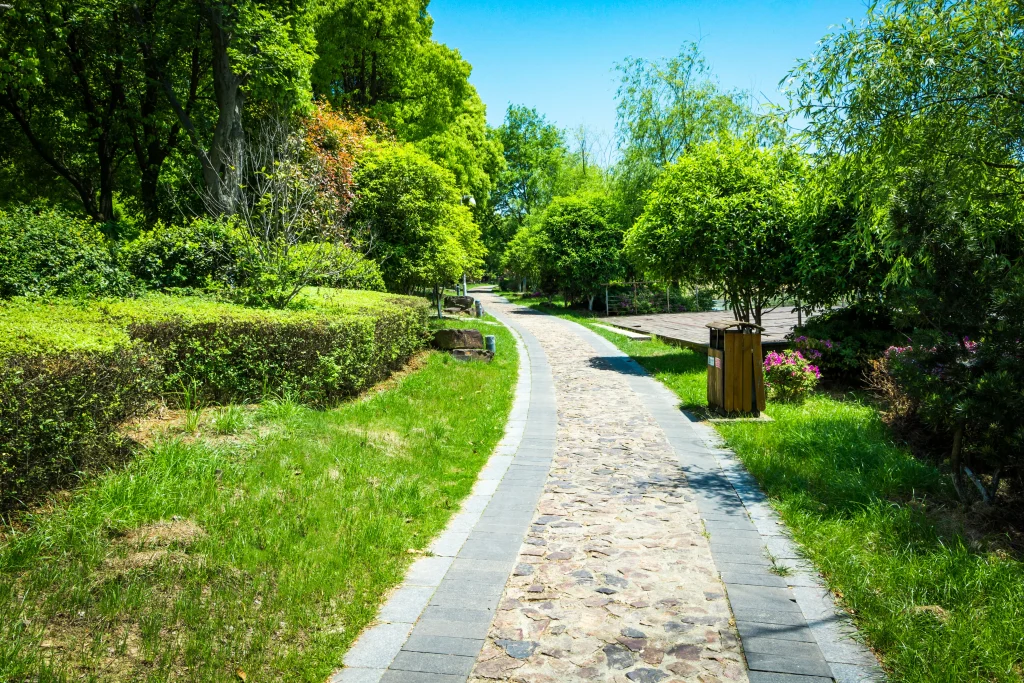A gravel driveway isn’t just practical – it’s a stylish, affordable, and eco-friendly way to boost your Denver home’s curb appeal. But with so many driveway rock types available, choosing the best chippings for driveway installations can feel overwhelming.
Should you prioritize durability over aesthetics? What gravel is best for driveways in Denver? How do you balance budget with long-term performance?
In this comprehensive guide, you’ll discover the 12 recommended gravel for driveway projects, complete with cost ranges, pros and cons, and maintenance requirements. We’ll help you navigate different types of gravel for driveways so you can select the ideal material that complements your landscape design.
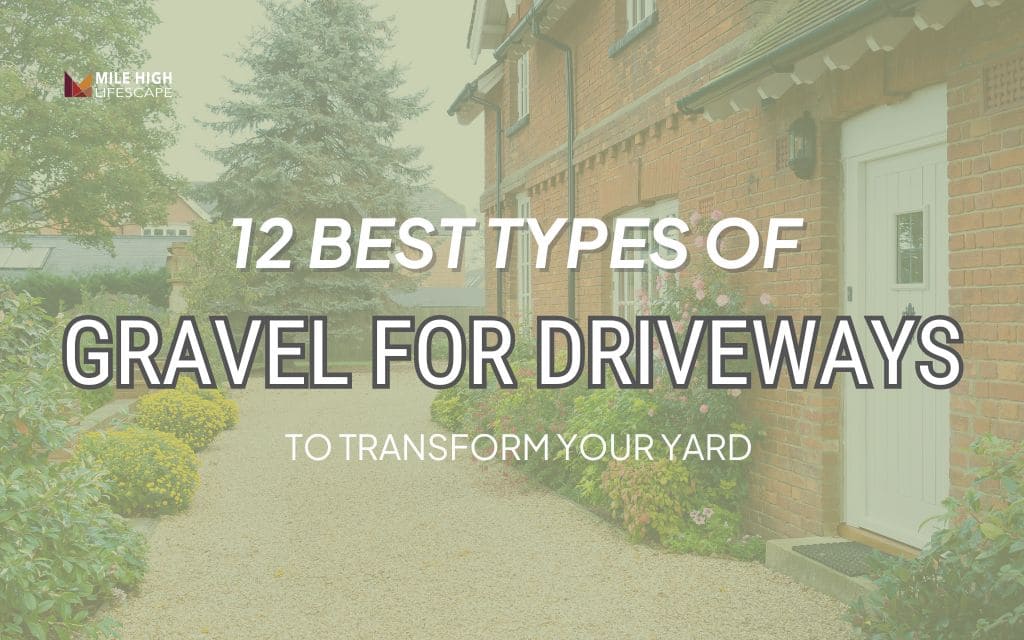
Check out more useful articles on rock landscaping here:
- 10 modern black rock landscape ideas for Denver homes
- Water-wise river rock flower beds: 15 creative designs for Denver gardens
- Low-maintenance rock desert landscape: 18 ideas to transform your Denver yard
12 best types of gravel for driveways
Quarry process (QP) / Crusher run
Best for: Driveway base layers and heavy-duty traction
“What gravel to use for driveway foundations,” the quarry process consistently tops the list. This powerhouse material combines crushed stone dust with ¾-inch aggregate, creating a mix that compacts so tightly it practically becomes a single solid surface.
What makes the quarry process exceptional for Colorado properties is its ability to handle our freeze-thaw ground movement. As temperatures swing from winter nights to spring afternoons, this material maintains its integrity while lesser gravels crack, shift, or develop those annoying ruts that collect snowmelt.
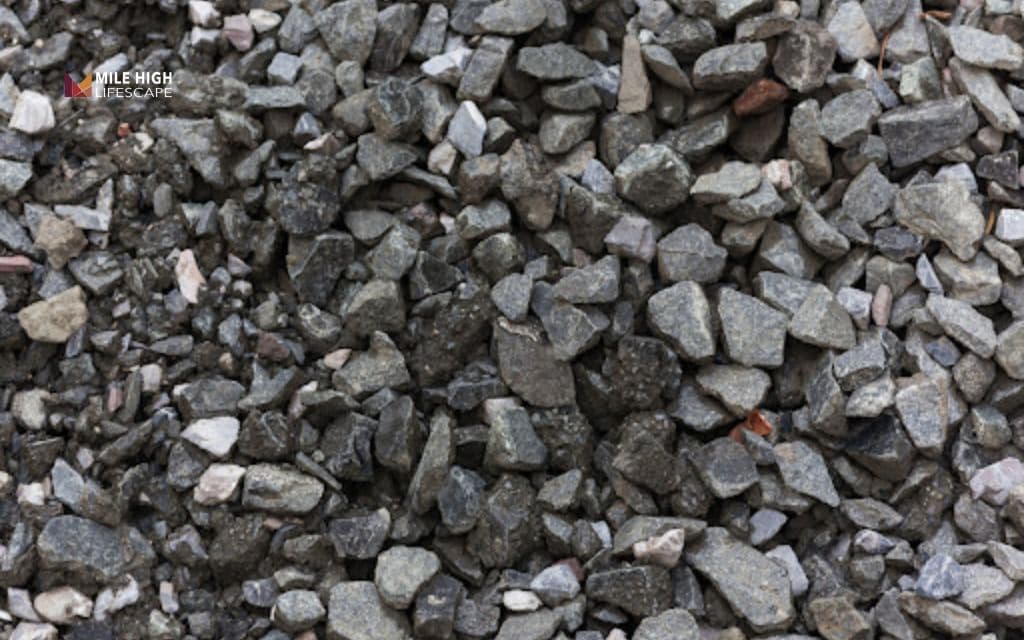
Jersey shore gravel
Best for: Coastal-inspired or light decorative driveways
Jersey Shore gravel brings warm, golden-yellow tones that evoke seaside charm – think smooth stones reminiscent of sun-bleached shells and sand dunes.
This gravel to use for driveways adds instant warmth and brightness. The light color reflects sunlight beautifully, making it particularly effective for illuminating shaded areas or narrow side driveways that don’t receive direct sun.
However, garden lovers should note that Jersey Shore works best on flat or gently sloping terrain. Its rounded stones lack the angular edges needed for steep incline traction. Proper edging is essential to contain the material and prevent spreading into adjacent garden beds.
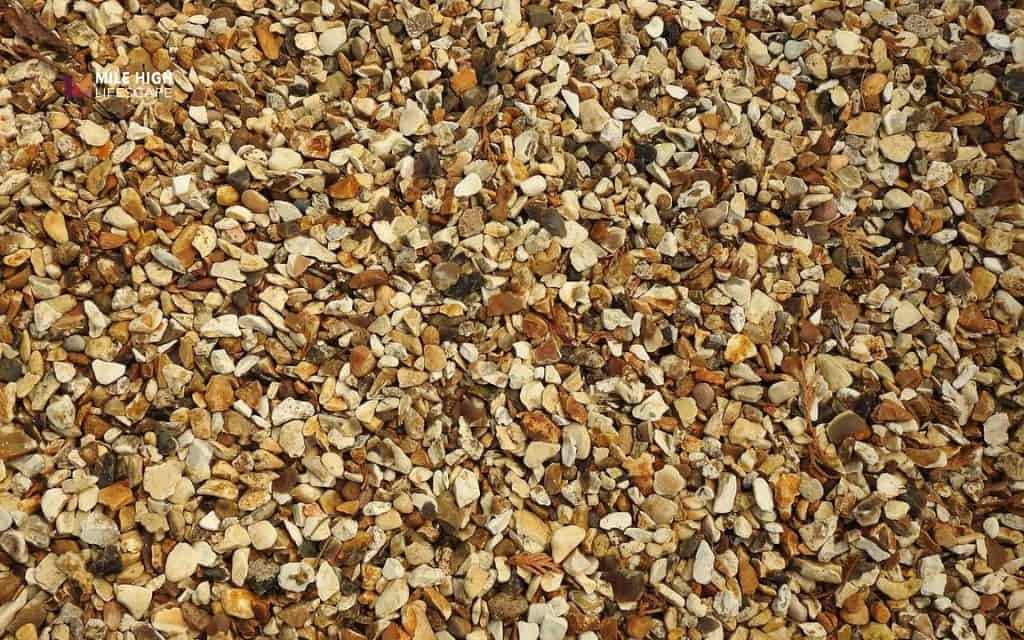
Lava rock
Best for: Bold, eco-friendly, modern driveway designs
For homeowners seeking gravel types that make a dramatic statement, lava rock delivers unmatched visual impact. This lightweight volcanic material comes in deep red, burgundy, or sleek black tones that create striking contrast in xeriscaped or contemporary desert-style landscapes.
Beyond aesthetics, lava rock excels functionally. Its porous structure provides drainage – crucial for properties dealing with snowmelt and spring storms. The material also offers natural heat resistance, staying cooler underfoot during summer months compared to darker, denser stone alternatives.
Need creative ideas for using lava rocks in your garden? Check out the following article.
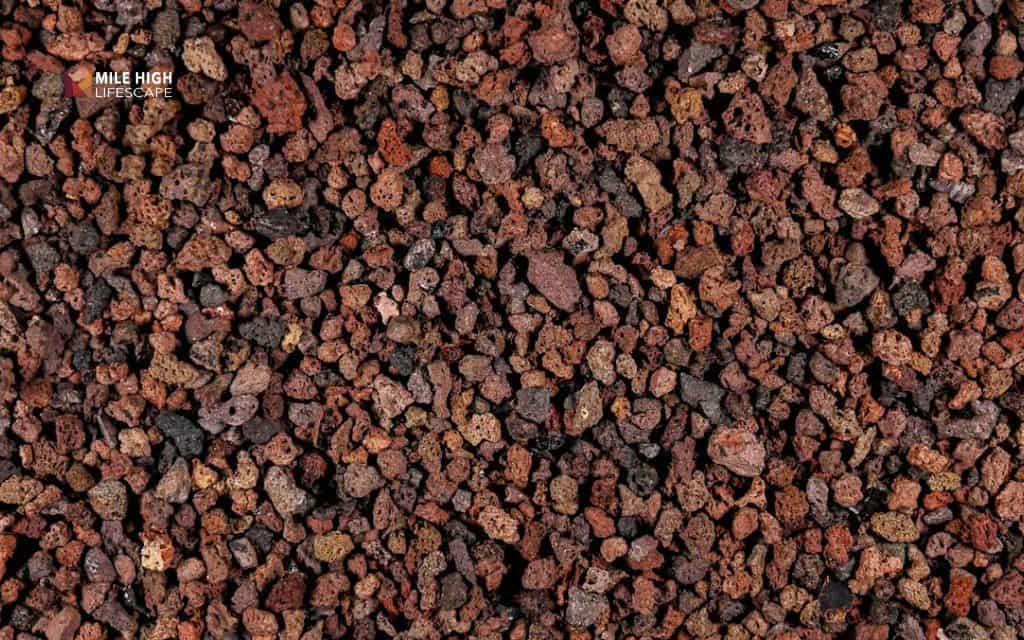
Marble chips
Best for: High-end, decorative, and luxury properties
When budget isn’t the primary constraint, marble chips deliver undeniable luxury. These pure white or soft gray crushed pieces reflect sunlight with an almost luminous quality, creating an elegant entrance that elevates your entire property’s aesthetic.
This premium gravel for driveway installations suits modern architectural styles, particularly contemporary homes with clean lines or Mediterranean-inspired properties with stucco exteriors.
The bright surface also excels at illuminating shaded areas, making marble chips strategic for driveways lined with mature trees or situated on the north side of structures.
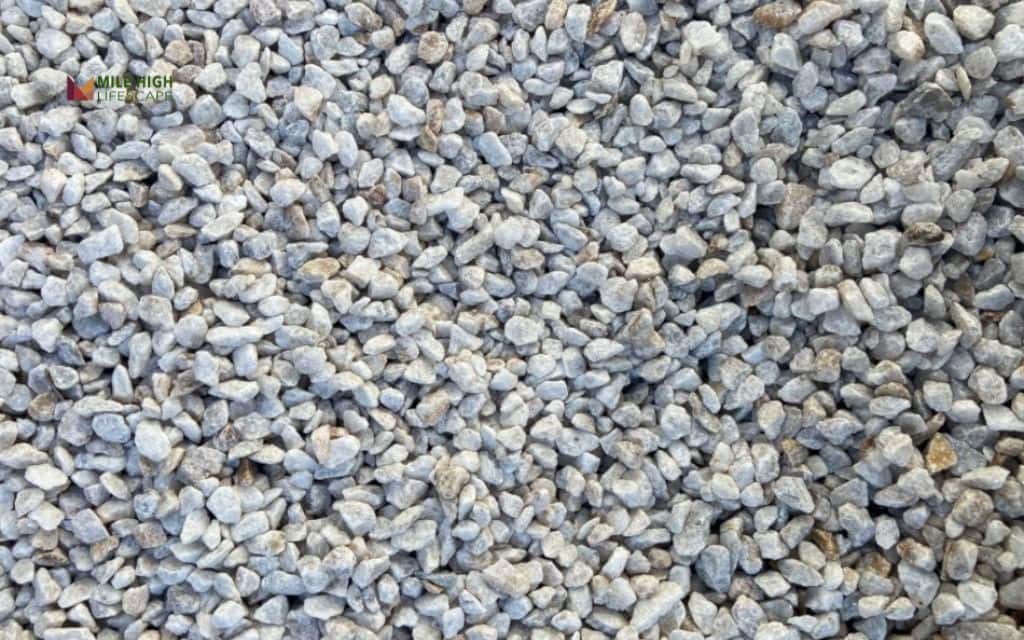
Blackstar (blackstrap) gravel
Best for: Contemporary and minimalist driveways
Urban Denver neighborhoods like Highlands, Sloan’s Lake, and LoHi have embraced Blackstar gravel for its sleek, sophisticated appeal. This charcoal-gray crushed basalt or granite perfectly complements modern architecture while providing excellent functional performance.
The gray color provides contrast against light-colored siding, white trim, or pale stone exteriors. When incorporated into xeriscape designs with ornamental grasses and native perennials, Blackstar creates a cohesive, intentional landscape that feels contemporary yet rooted in place.
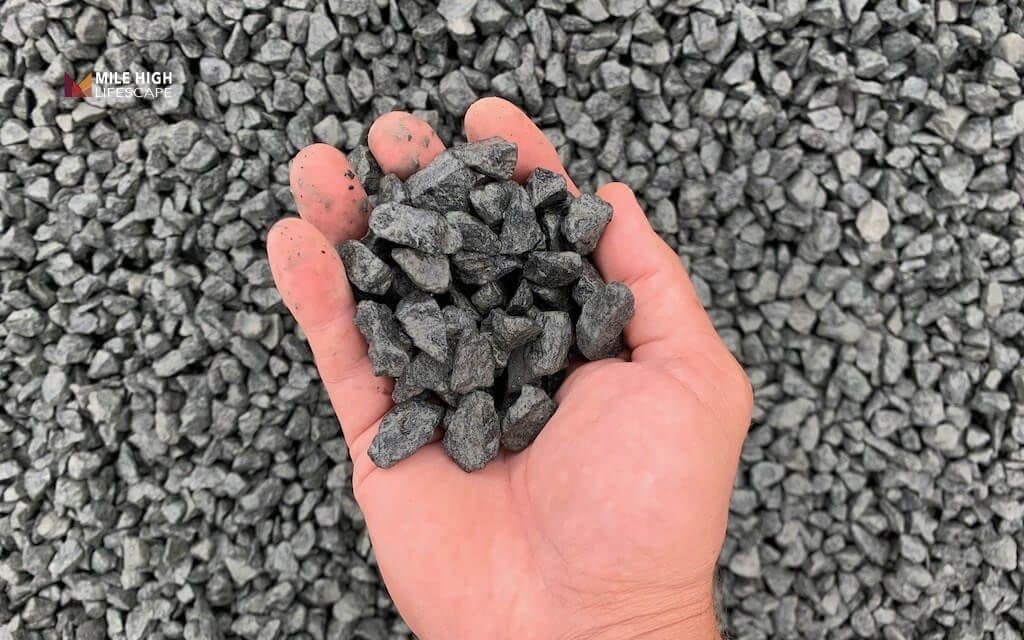
Crushed granite gravel
Best for: Classic Denver driveways with natural appeal
If there’s a “Colorado classic” among driveway rocks, crushed granite claims that title. This durable, angular material compacts for firm traction while blending with the state’s native stone architecture and natural landscapes.
Crushed granite handles our challenging climate with grace. The angular edges lock together under compression, creating a stable surface that resists rutting. Simultaneously, the material allows excellent water drainage.
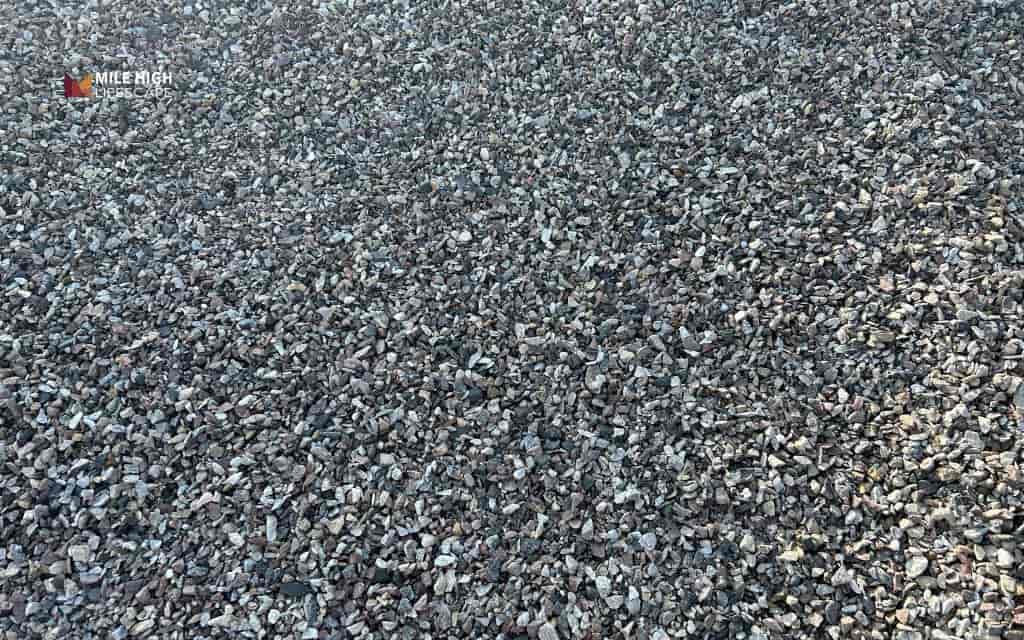
Pea gravel
Best for: Decorative, family-friendly, and soft-surface driveways
Garden lovers with children or pets often gravitate toward pea gravel for its comfortable, walkable texture. These small, rounded stones (¼ to ½ inch) feel pleasant underfoot and create a gentle transition between hardscape and landscape areas.
The natural color palette (soft tans, warm grays, and creamy whites) integrates with garden plantings. Pea gravel works well for properties where the driveway connects to garden paths, creating visual continuity throughout the landscape.
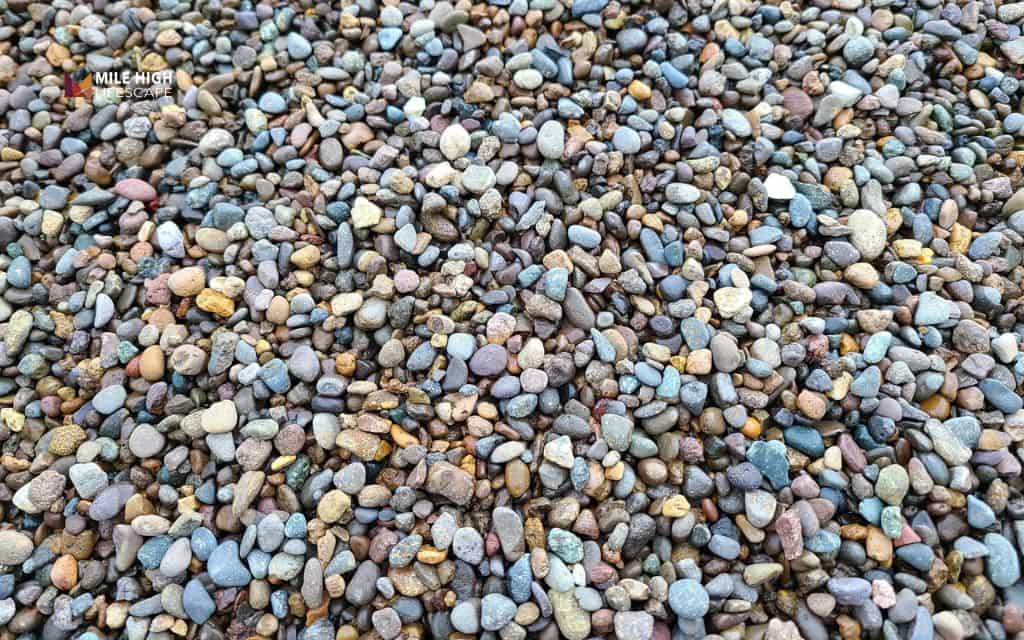
Crushed limestone
Best for: Budget-friendly, firm, traditional driveways
For homeowners prioritizing performance and value, crushed limestone delivers reliable results. This compactable material becomes solid over time, eventually achieving a semi-firm surface that handles vehicle traffic.
The light gray color brightens shaded areas – a good choice for driveways lined with mature trees or situated on the north side of properties.
One consideration: Limestone can gradually raise soil pH as it weathers and breaks down. Position this material if your landscape includes acid-loving plants like rhododendrons, azaleas, or blueberries.
However, most Colorado soils tend toward alkaline, so this effect often proves negligible.
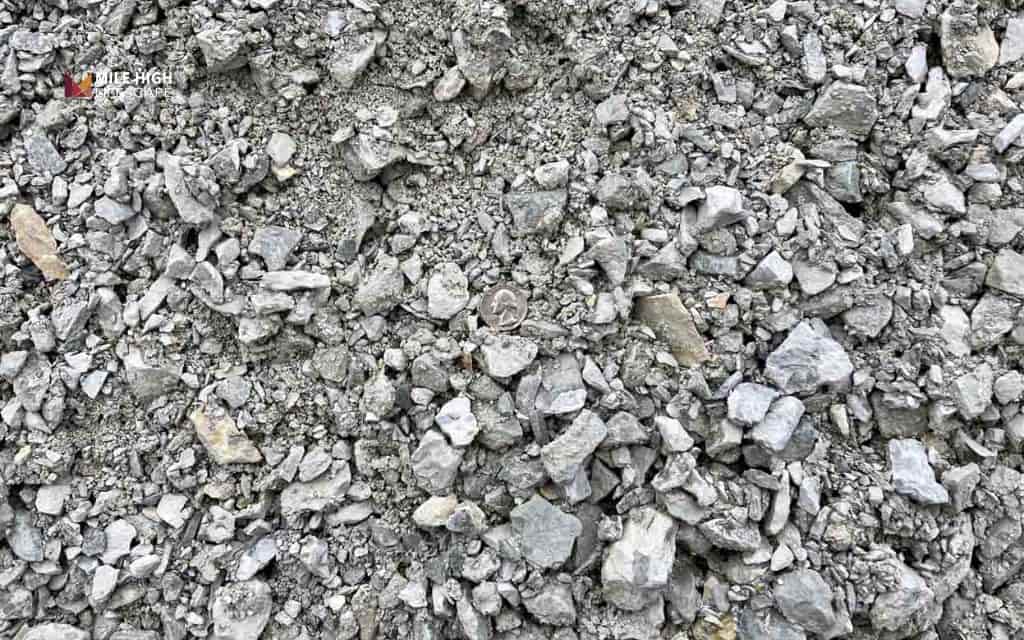
Recycled concrete gravel
Best for: Eco-conscious and cost-effective installations
This material repurposes crushed concrete debris from demolition projects, diverting waste from landfills while creating a strong, functional driveway surface.
The crushed concrete provides excellent structural support and durability, particularly when used as a base layer. For long rural driveways or properties on larger lots where significant material quantities drive up costs, recycled concrete offers substantial savings.
The light gray color complements most architectural styles. While it may not win beauty contests against marble chips or lava rock, recycled concrete’s honest, utilitarian character suits practical homeowners who value substance over showiness.
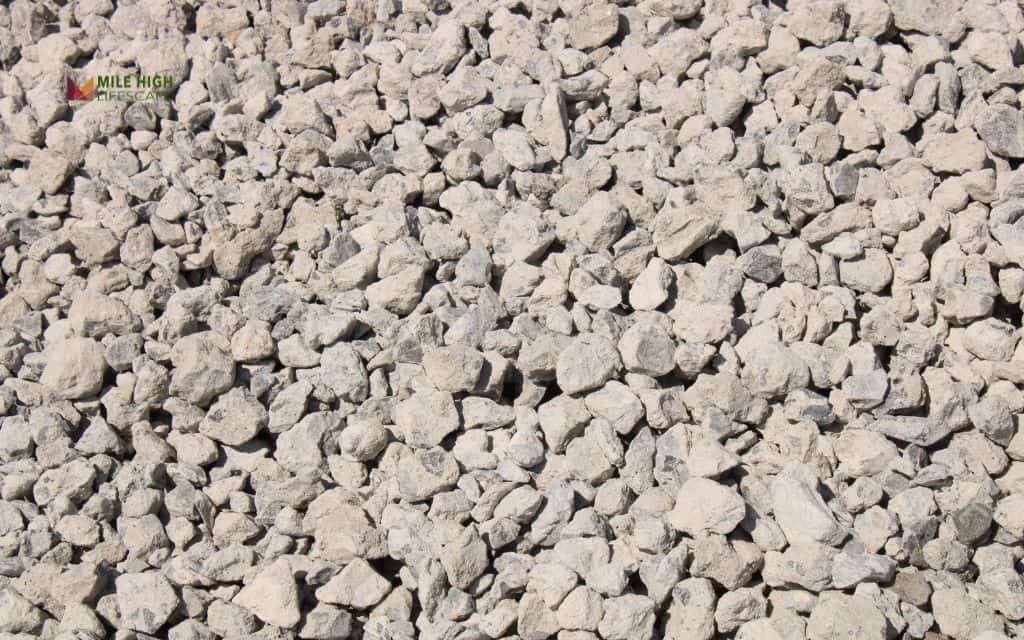
River rock gravel
Best for: Decorative or premium-grade driveway accents
River rock brings the smooth, organic beauty to residential landscapes.
The smooth surfaces and varied colors make river rock particularly appealing for garden lovers who want their driveway to feel like an extension of the landscape rather than a purely functional space.
The material provides excellent drainage, allowing water to percolate through without pooling.
However, the rounded shape that makes river rock beautiful also creates challenges. Without angular edges to lock together, the stones shift easily under tire pressure.
Many landscape designers recommend combining river rock with crushed granite or decomposed granite. The angular base of granite provides stability and river rock creates the desired aesthetic on top. Discover creative river rock ideas for your garden in this article.
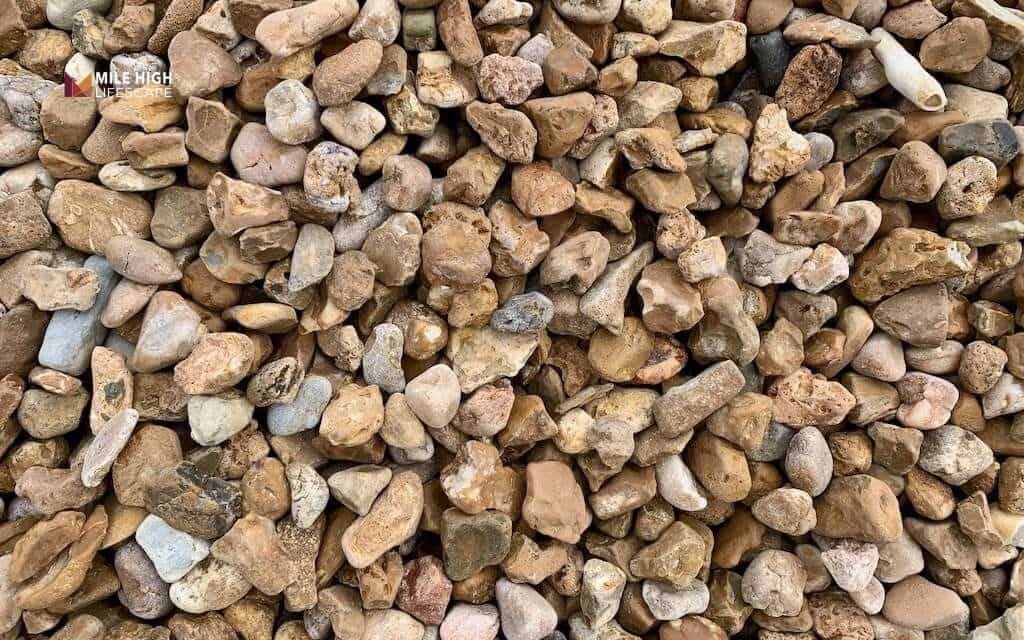
Decomposed granite (DG)
Best for: Modern, walkable, and eco-friendly driveways
This fine-textured material compacts into a stable, almost concrete-like surface that feels both natural and refined.
The color options are stunning: warm rose tones, soft golds, rich tans, and subtle grays. These earthy hues complement natural landscapes while working with any architectural style. The smooth, compacted surface creates a clean, contemporary look that appeals to minimalist sensibilities.
Beyond aesthetics, DG excels functionally. The material provides excellent drainage and natural erosion control. The fine particles compact tightly, creating a surface firm enough for vehicles yet permeable enough to satisfy sustainable landscape goals.
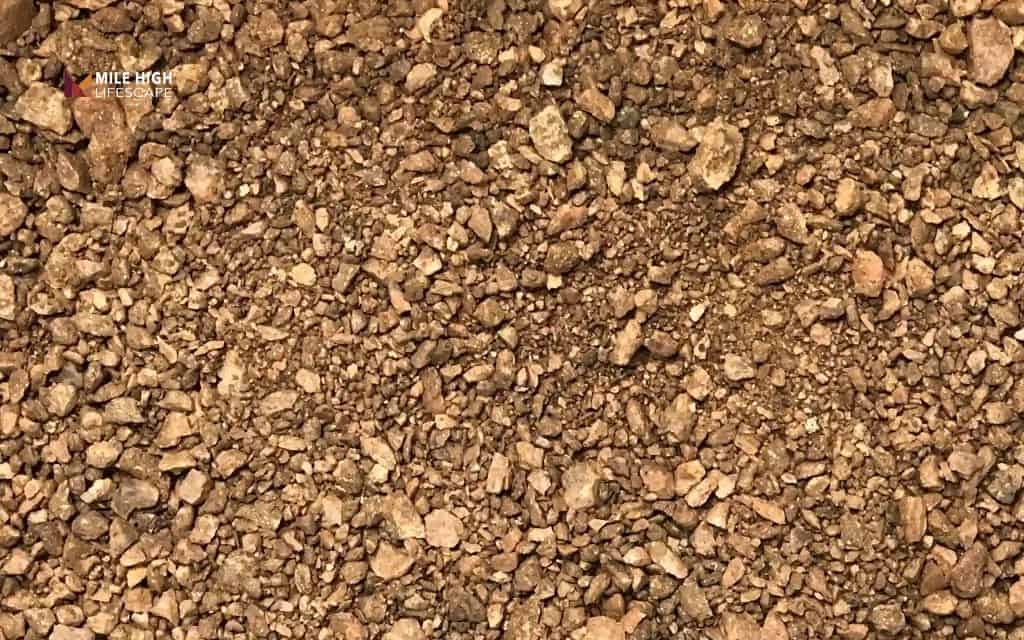
Caliche gravel
Best for: Rural or acreage driveways needing a solid, inexpensive surface
For properties in the foothills or on larger acreage, caliche gravel offers unbeatable value.
Once properly compacted and allowed to cure, caliche creates a remarkably solid surface that handles vehicle traffic without the expense of asphalt or concrete. For long rural driveways where material quantities would make premium gravel prohibitively expensive, caliche provides a practical solution.
The earth-toned appearance blends with Colorado’s high desert landscapes. Caliche’s honest functionality and minimal cost make it ideal for practical homeowners focused on performance over aesthetics.
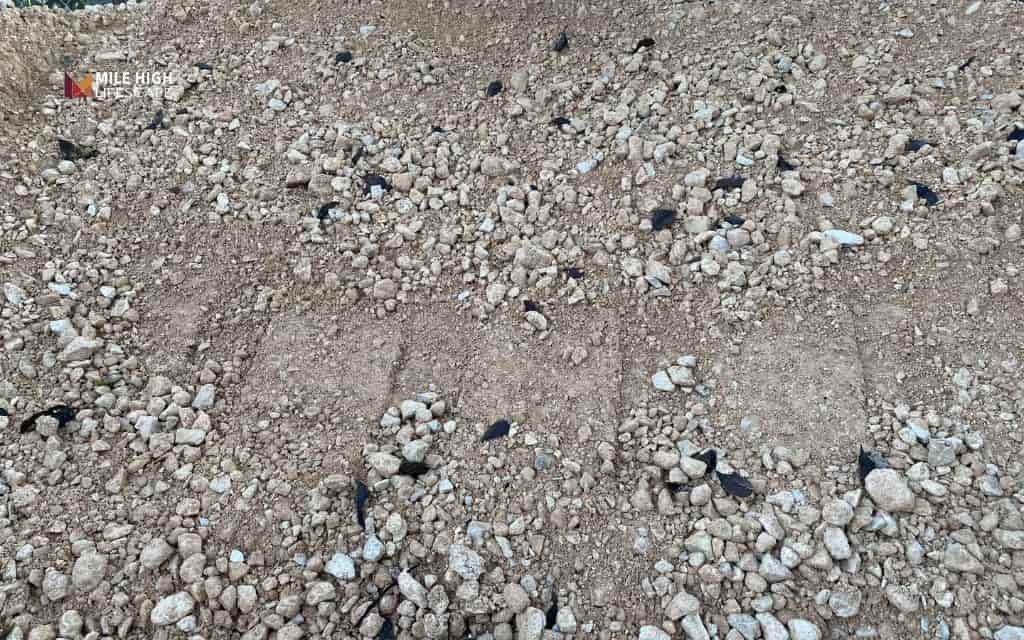
Gravel type comparison summary
| Gravel Type | Cost (per cu yd) | Durability | Drainage | Maintenance |
| Quarry Process | $40 – $70 | ★★★★★ | Moderate | Low |
| Jersey Shore | $65 – $90 | ★★★☆☆ | Good | Medium |
| Lava Rock | $90 – $140 | ★★★☆☆ | Excellent | Low |
| Marble Chips | $120 – $160 | ★★★★☆ | Moderate | Low |
| Blackstar | $100 – $140 | ★★★★☆ | Excellent | Low |
| Crushed Granite | $65 – $100 | ★★★★★ | Excellent | Low |
| Pea Gravel | $50 – $75 | ★★☆☆☆ | Good | Medium |
| Crushed Limestone | $45 – $80 | ★★★★☆ | Moderate | Low |
| Recycled Concrete | $30 – $60 | ★★★★☆ | Good | Low |
| River Rock | $80 – $130 | ★★★☆☆ | Excellent | Medium |
| Decomposed Granite | $65 – $110 | ★★★★☆ | Excellent | Medium |
| Caliche Gravel | $25 – $50 | ★★★★☆ | Good | Medium |
For Denver, the best performance combination is quarry process as your base layer topped with crushed granite or blackstar. This pairing delivers unmatched stability and design appeal.
How to choose the best gravel for your driveway
Assess your terrain
Your property’s topography influences what gravel is best for driveways on your specific site.
Steep slopes demand angular gravel types that lock together for traction. Crushed granite, quarry process, or Blackstar prevent sliding and provide grip even when wet or icy.
Flat or gently sloping areas offer more flexibility; rounded gravels like pea gravel or river rock work beautifully when properly edged and supported.
Walk your driveway route during different weather conditions. Where does water collect? Which areas receive full sun versus shade? Does your drive cut across a slope or follow natural contours? These observations guide material selection and installation strategies.
Consider drainage
The recommended gravel for driveway drainage includes materials with excellent permeability: crushed granite, decomposed granite, lava rock, and river rock all allow water to flow through rather than pooling on the surface.
Layer your driveway strategically for optimal drainage. Start with a compacted base of coarser material, add geotextile fabric to prevent soil mixing, then top with your chosen surface gravel.
For properties where snowmelt or storms create significant runoff, consider adding French drains along the driveway edges to channel water away from the surface.
Match style with home exterior
Your driveway should feel like an intentional extension of your property’s overall design. Garden lovers understand this: just as you wouldn’t plant tropical palms around a mountain cabin, your driveway material should harmonize with architectural character.
- Rustic or mountain homes: River rock, caliche, or crushed limestone complement natural wood siding and stone elements
- Modern or contemporary architecture: Decomposed granite, crushed granite, or Blackstar emphasize clean lines and sophisticated simplicity
- Farmhouse or craftsman style: Crushed limestone or recycled concrete honor traditional sensibilities
- Mediterranean or stucco exteriors: Marble chips or light-colored Jersey Shore gravel enhance sun-drenched aesthetics
- Xeriscape or desert-modern landscapes: Lava rock or decomposed granite integrate with native plantings
Set a realistic budget
Different types of gravel for driveways carry varying costs beyond the per-cubic-yard material price. Factor in delivery charges (often $50 – $150 depending on distance and quantity), equipment rental if you’re DIYing, edging materials ($3 – $15 per linear foot), geotextile fabric ($0.25 – $0.50 per square foot), and labor if hiring professionals ($2 – $5 per square foot for installation).
For a standard two-car driveway (approximately 600 square feet, 20 feet wide by 30 feet long), expect total costs ranging from $900 for basic caliche to $4,000+ for premium marble chips with professional installation.
Consider long-term value rather than only upfront expenses. Spending more on durable materials like crushed granite saves money over time compared to frequently replacing cheaper options that wash away or require constant maintenance.
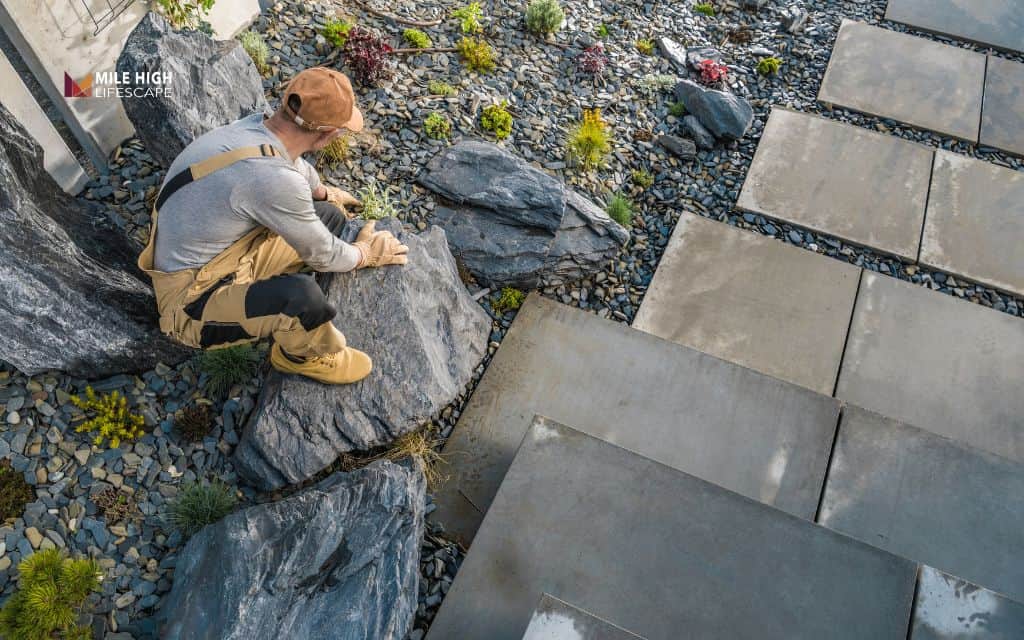
Installation tips for a long-lasting gravel driveway
Proper installation makes the difference between a driveway that lasts decades and one that requires major repairs within a few years.
Follow these steps for professional-quality results:
- Excavation: Remove 6 – 8 inches of depth along the entire driveway route. Clear away all organic matter that will decompose and create settling over time.
- Fabric barrier: Install geotextile landscape fabric across the entire excavated area. This crucial layer prevents soil from mixing upward into gravel while blocking weeds from growing through. Overlap seams by at least 6 inches.
- Base layer: Add 3 – 4 inches of coarse base material – quarry process, crushed concrete, or road base. This foundational layer provides structural support and drainage.
- Compaction: Thoroughly compact the base using a plate compactor or roller. Make multiple passes until the surface feels rock-solid underfoot. This step is non-negotiable for long-term success.
- Surface layer: Add 2 inches of your chosen decorative gravel. Spread evenly and compact again, though less aggressively than the base to avoid crushing decorative stones.
- Edging: Install edging material (metal, plastic, stone, or pressure-treated wood) to contain gravel and maintain clean borders. Proper edging prevents spreading and makes the installation look intentional and finished.
- Final grading: Ensure the driveway crowns slightly in the center (approximately 2% grade) so water naturally flows to the edges rather than pooling in the middle.
Maintenance & longevity tips
Even the best chippings for driveway installations require attention to maintain appearance and function. Fortunately, gravel maintenance proves far simpler than asphalt or concrete repairs.
- Annual refilling: After spring snowmelt, inspect for low spots where gravel has compacted or migrated. Add material to these areas and rake smooth. A cubic yard or two typically suffices for standard driveways.
- Regular raking: Every 3 – 6 months, rake the surface to redistribute gravel evenly and maintain consistent texture. This simple task prevents ruts from developing in high-traffic areas.
- Edging inspection: Check borders quarterly. Repair or reinforce edging where gravel has pushed against barriers or landscape plantings. Well-maintained edges prevent expensive gravel loss.
- Surface refresh: Every 3 – 5 years, add a fresh 1-inch layer of surface gravel. This modest investment improves appearance while replenishing material lost to vehicle traffic and weather.
- Drainage maintenance: Keep drainage features clear of debris. If you’ve installed French drains or culverts, flush them annually to prevent clogging.
Conclusion
A well-planned gravel driveway offers beauty, performance, and sustainability perfectly suited to Denver’s unique climate and landscape character.
Whether you prefer the refined texture of crushed granite, the natural appeal of river rock, or the strength of recycled concrete, choosing the right material ensures your driveway looks gorgeous and functions reliably for decades.
__________
Mile High Lifescape – Expert Gravel Driveway Installation in Denver
Mile High Lifescape has provided trusted landscaping rock services for years in Denver. Our experienced landscapers specialize in selecting and installing the perfect gravel types tailored to Colorado’s climate and your property.
We handle every detail: terrain assessment, proper base preparation, drainage solutions, professional compaction, and quality edging that keeps your driveway looking pristine for decades.
Ready to install a professional gravel driveway? Call Mile High Lifescape: (303) 877-9091
Frequently asked questions (FAQ)
What is the most durable gravel for driveways?
Crushed granite and quarry process rank highest for durability. Both materials feature angular edges that lock together under compression, resisting rutting and displacement through freeze-thaw cycles. For long-term performance with minimal maintenance, these materials outperform rounded alternatives.
How deep should gravel be for a driveway?
Plan for a minimum total depth of 4 – 6 inches, combining base and surface layers. Optimal installations include 3 – 4 inches of base gravel (quarry process or crushed concrete) topped with 2 inches of decorative surface material. High-traffic driveways benefit from slightly deeper bases – up to 6 inches of base plus 2 – 3 inches of surface gravel.
Can I use pea gravel for my driveway?
Yes. Pea gravel works for flat driveways with light vehicle traffic, particularly when combined with stabilizing grids that prevent shifting. However, avoid pea gravel on slopes steeper than 5% or for driveways regularly accommodating heavy vehicles. The rounded stones lack the interlocking capability needed for these applications.
How do I stop gravel from washing away?
Prevent gravel migration through multiple strategies: install solid edging along all borders, compact multiple layers over geotextile fabric, ensure proper drainage gradients (crown the center), and choose angular gravels that lock together. For steep slopes, consider using heavier materials like Blackstar or incorporating stabilizing grids.
Is gravel better than asphalt for driveways?
For flexibility, cost-effectiveness, and eco-friendliness, gravel often proves superior. Asphalt cracks when ground shifts beneath it, requiring expensive resurfacing. Gravel naturally accommodates ground movement, costs less, and allows water permeation. However, asphalt provides a smoother, more formal surface if that aesthetic appeals to you.
